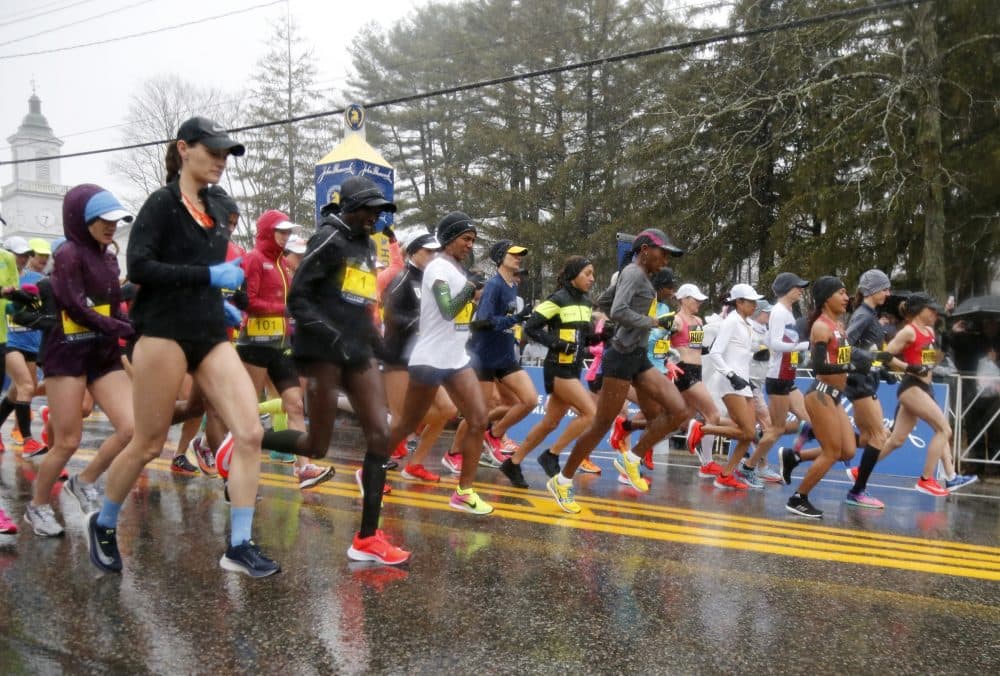Advertisement
Certain Gut Bacteria May Improve Exercise Performance, Harvard Study Suggests

New research from Harvard Medical School suggests that the key to getting more out of your workouts could be living in your gut.
The study just published in Nature Medicine shows that a particular species of gut bacteria called Veillonella, which is abundant in marathon runners, seems to improve running performance and help people exercise for longer periods of time.
It also could be a key to helping people with diabetes, cardiovascular disease and other chronic illnesses live healthier, more active lives.
WBUR spoke with Aleksandar Kostic, assistant professor of microbiology at Harvard Medical School and Joslin Diabetes Center and an author of the study, about the connection between the microbiome and the ability to exercise.
This interview has been edited for clarity and length.
What was the idea behind studying the microbiome this way?
What we had in mind was to understand the microbiome of supremely healthy individuals. So if we can identify unique features of their microbiome, would it be possible that these unique features could directly be benefiting them and, therefore, is this something that's translatable from a medical perspective to other people?
This is how we came to focus on the Boston Marathon. We recruited a set of elite runners in the Boston Marathon and tracked their microbiome the week before and the week after the marathon. We were trying to ask, "What's unique in these elite athletes relative to a sedentary population — a bunch of scientists in this case?"
And also, "What changes in the microbiome in the course of running a marathon?"
What did you find?
What we saw when we started analyzing the data was this really strong association with a single genus of bacteria called Veillonella.
Not only was Veillonella more abundant in athletes before the marathon relative to our sedentary population, but it also significantly increased in the days after the marathon. And what really prompted our interest in this organism was that it was known that it uses lactic acid or lactate as its preferred energy source.
Lactic acid is the stuff that builds up in your muscles and makes them feel fatigued, right?
Yes. Our hypothesis was that this microbe in the gut could potentially work as a lactate “sink” to remove lactate for muscles.
So we measured the run-time until exhaustion of mice that have a strain of Veillonella from one of our athletes and compared them to mice colonized by other human gut microbes that were known not to be able to use lactate.
Long story short, mice colonized with Veillonella saw a significant increase in their run-time until exhaustion — about 13%. Of course, we haven't tested this in humans yet. But this is still a result we were very excited about.
What kind of initial reaction did other researchers have when you told them about the preliminary findings?
It turns out that this idea of lactate in the muscles causing fatigue is not generally accepted in the exercise and physiology field, which came as kind of a surprise. If it's not about the removal of lactate, maybe the key is what [Veillonella] is converting the lactate into: the short-chain fatty acid propionate.
So we introduced propionate itself to mice intra-rectally to reproduce the physiologically significant increase in the gut. What we showed is that their ability to run was replicated to a level very similar to what we saw with the whole colonization of Veillonella.
So while propionate isn't the whole story, propionate being produced by Veillonella in response to an influx of lactate is sufficient to account for a significant increase in running ability.
You've said you were skeptical of the project originally. What do you think now?
At the outset, I didn't really understand what the microbiome would have to do with exercise. But in retrospect, it seems almost obvious now to me. The microbiome is this gigantic metabolic engine – a hundred-trillion-organisms-strong engine — that interfaces with all of the metabolism happening in us.
I think in that way Veillonella is just kind of scratching the surface, just one example of a bug that's tapped into the metabolism of exercise. I have no doubt that it's just one of many and just the beginning of this story.
(Readers, you're halfway through the race! Read on if you love running and/or microbes!)
You've talked about this bacteria "blooming" in athletes (and mice) after they finish running. It makes me think of muscles building endurance and becoming more used to exercise. Could the gut microbiome become more adapted to exercise in the same way that muscles do over time?
We don't have direct data to support this yet, but that's what I think. Marathon runners still had higher Veillonella abundance than the general population even before racing.
So it would make sense if there's a potential positive feedback loop where if you're a runner who's constantly producing lactate, you're creating this unique metabolic niche for Veillonella. The more you exercise, the more your Veillonella abundance increases, and so on.
How can this knowledge be used potentially for treatment options?
Exercise capacity is the strongest single predictor of human health and longevity, and lower exercise capacity is something that's known to predispose people towards diabetes, cardiovascular disease and other very important chronic diseases.
Is it possible that we can isolate these Veillonella strains from athletes, colonize them into people at risk for these chronic diseases and help them increase their exercise capacity and therefore stave off these diseases? This to me is the most important application of this work.
Are there any diets or supplements aside from just exercise that would help you increase the concentration of such healthy gut bacteria?
The microbiome is really a new field, and we simply can't predict microbiome changes based on changes in diet except in very rough terms. I think there are some microbiome startups that take a little bit too much liberty with the science and seem to promise that you can tweak your diet in very specific ways in order to promote certain organisms.
But what we do know is that, within our athletes, high vegetable consumption was correlated with higher abundance of Veillonella with very borderline statistical significance. And there has been at least one study in the past that has shown a correlation with a vegetarian diet and a higher abundance of Veillonella.
Certainly, we think about creating a freeze-dried version of the microbe that can be taken as a supplement just like other over-the-counter probiotics. There are several manufacturing challenges to making that happen, but it's something that is foreseeable in the future if it has the same benefit in humans, after doing clinical trials.
Are you concerned that some runners won't wait for the clinical trial and will try to manufacture their own supplements? And what are the risks of that?
I definitely do worry a little bit about what I see sometimes with do-it-yourself fecal microbiota transplants. I think the risk inherent is too great to be worth any potential benefit. The real consequence will only really be seen if we can demonstrate safety in humans for Veillonella.
As far as using propionate itself, that comes with risks. It's is an acidic molecule and could certainly have detrimental effects that we don't know about. So all of this is to say I don't recommend to action today, but certainly people are working hard to try to manufacture this in a safe way in the future.
